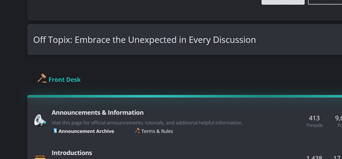- Thread Author
- #1
Gamification—the use of game mechanics like badges, points, and leaderboards to boost user engagement—has become a buzzword, but many companies are getting it wrong. They’re hoping that by slapping on a few digital rewards, they’ll spark a surge of activity from users. However, this often leads to disappointing results. So why doesn’t it work the way they expect?
Let’s dive deeper into the real issue with gamification: it doesn’t create value, it only reflects it.
Here’s the thing: users won’t care about earning a badge or climbing a leaderboard unless those rewards represent something meaningful to them. In the context of communities, that meaning is almost always tied to reputation. A badge is just a shiny icon unless it reflects the user’s standing within the community. If a user doesn’t care about their reputation in the group, they won’t care about earning a badge. It’s that simple.
In community-driven environments, reputation is everything. When a person’s contributions lead to higher status, that status means something—they’re seen as valuable, knowledgeable, or helpful. For example, many online forums use ranking systems where members earn higher levels based on their activity. As you post more, your rank improves. But what’s really happening is that your reputation within the community is growing. The rank isn’t the value itself; it’s just a symbol of that value.
Now, let’s take a moment to think about games like Fortnite, or even casual mobile games. These games often have leaderboards, but the rewards and status are isolated within the game’s ecosystem. They may not have an inherent social component, yet they still drive engagement. Why? Because they’re fun. And the fun is enough to keep users coming back.
But here’s the twist: even these games today understand the power of social engagement. Every popular game now includes some social aspect—whether it’s online leaderboards, clans, or in-game competitions with friends. Why? Because humans are social creatures. We care about how we measure up against the people we know. It’s the social context that makes the gamified experience compelling. The idea of “beating your friends” or “competing within your network” triggers something deeper: a desire for status among people you trust, know, and care about.
This is where relationships matter. Think about it: do the people in your community know each other? Are they building real relationships? If they aren’t, why would they care about their standing in that group? If there’s no connection, there’s no reason to care about the ranking, because those badges or points have no real impact on their identity within that network.
Gamification works best when it taps into a sense of social comparison—when members compete with each other because they care about impressing those around them. Leaderboards are powerful when you’re comparing yourself to people you know, respect, and want to show off in front of. It’s why you see intense competition in games where players know each other and have established rivalries or friendships. It’s why, for instance, Foursquare succeeded so brilliantly. The app didn’t just reward users for visiting places—it tapped into local, social dynamics. Users competed to be the “mayor” of a bar or a restaurant, which wasn’t just about accumulating points—it was about improving their reputation within their social circle. The more they checked in, the more their social standing grew. The badge wasn’t just a trophy; it was a symbol of social capital.
What this shows is that gamification doesn’t inherently create value. It reflects the value that already exists within a community. If your members already feel connected, engaged, and recognized for their contributions, then gamification elements like badges, rankings, or points can work to amplify engagement.
But this only works if your community is already healthy and thriving. If members connect with each other, share meaningful interactions, and feel a sense of pride when they contribute, then the desire for recognition will naturally emerge. In that context, gamification can act as a tool to highlight and celebrate those contributions, giving them a tangible, visible reward. But if your community doesn’t have that foundation—if the relationships aren’t there—then no amount of badges will spark real engagement.
So, what does this mean for businesses and community managers? Focus on building authentic connections within your community first. Create a space where members feel respected, valued, and recognized for their contributions. Once that foundation is set, gamification can enhance the experience by making that recognition more visible. It’s not about throwing badges at users and hoping they’ll get excited. It’s about creating an environment where they’re already engaged, and gamification simply amplifies their sense of accomplishment and belonging.
In short: gamification is not a quick fix. It’s a tool that works only when the value behind it is already firmly in place. When it’s used correctly, gamification can unlock deeper engagement and build a thriving community. But it’s the connections, relationships, and shared sense of identity within the group that ultimately drive lasting activity.
Let’s dive deeper into the real issue with gamification: it doesn’t create value, it only reflects it.
Here’s the thing: users won’t care about earning a badge or climbing a leaderboard unless those rewards represent something meaningful to them. In the context of communities, that meaning is almost always tied to reputation. A badge is just a shiny icon unless it reflects the user’s standing within the community. If a user doesn’t care about their reputation in the group, they won’t care about earning a badge. It’s that simple.
In community-driven environments, reputation is everything. When a person’s contributions lead to higher status, that status means something—they’re seen as valuable, knowledgeable, or helpful. For example, many online forums use ranking systems where members earn higher levels based on their activity. As you post more, your rank improves. But what’s really happening is that your reputation within the community is growing. The rank isn’t the value itself; it’s just a symbol of that value.
Now, let’s take a moment to think about games like Fortnite, or even casual mobile games. These games often have leaderboards, but the rewards and status are isolated within the game’s ecosystem. They may not have an inherent social component, yet they still drive engagement. Why? Because they’re fun. And the fun is enough to keep users coming back.
But here’s the twist: even these games today understand the power of social engagement. Every popular game now includes some social aspect—whether it’s online leaderboards, clans, or in-game competitions with friends. Why? Because humans are social creatures. We care about how we measure up against the people we know. It’s the social context that makes the gamified experience compelling. The idea of “beating your friends” or “competing within your network” triggers something deeper: a desire for status among people you trust, know, and care about.
This is where relationships matter. Think about it: do the people in your community know each other? Are they building real relationships? If they aren’t, why would they care about their standing in that group? If there’s no connection, there’s no reason to care about the ranking, because those badges or points have no real impact on their identity within that network.
Gamification works best when it taps into a sense of social comparison—when members compete with each other because they care about impressing those around them. Leaderboards are powerful when you’re comparing yourself to people you know, respect, and want to show off in front of. It’s why you see intense competition in games where players know each other and have established rivalries or friendships. It’s why, for instance, Foursquare succeeded so brilliantly. The app didn’t just reward users for visiting places—it tapped into local, social dynamics. Users competed to be the “mayor” of a bar or a restaurant, which wasn’t just about accumulating points—it was about improving their reputation within their social circle. The more they checked in, the more their social standing grew. The badge wasn’t just a trophy; it was a symbol of social capital.
What this shows is that gamification doesn’t inherently create value. It reflects the value that already exists within a community. If your members already feel connected, engaged, and recognized for their contributions, then gamification elements like badges, rankings, or points can work to amplify engagement.
But this only works if your community is already healthy and thriving. If members connect with each other, share meaningful interactions, and feel a sense of pride when they contribute, then the desire for recognition will naturally emerge. In that context, gamification can act as a tool to highlight and celebrate those contributions, giving them a tangible, visible reward. But if your community doesn’t have that foundation—if the relationships aren’t there—then no amount of badges will spark real engagement.
So, what does this mean for businesses and community managers? Focus on building authentic connections within your community first. Create a space where members feel respected, valued, and recognized for their contributions. Once that foundation is set, gamification can enhance the experience by making that recognition more visible. It’s not about throwing badges at users and hoping they’ll get excited. It’s about creating an environment where they’re already engaged, and gamification simply amplifies their sense of accomplishment and belonging.
In short: gamification is not a quick fix. It’s a tool that works only when the value behind it is already firmly in place. When it’s used correctly, gamification can unlock deeper engagement and build a thriving community. But it’s the connections, relationships, and shared sense of identity within the group that ultimately drive lasting activity.


